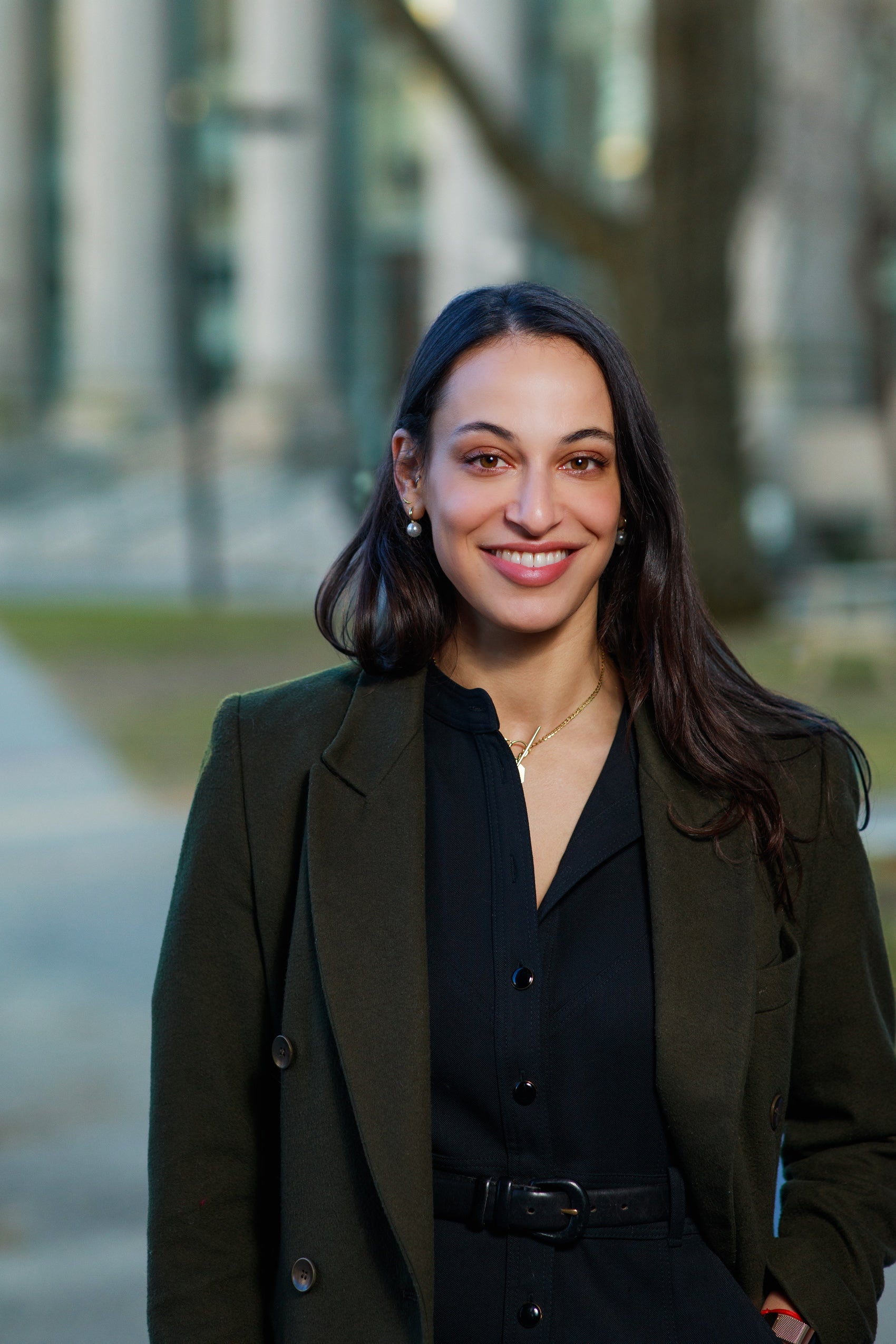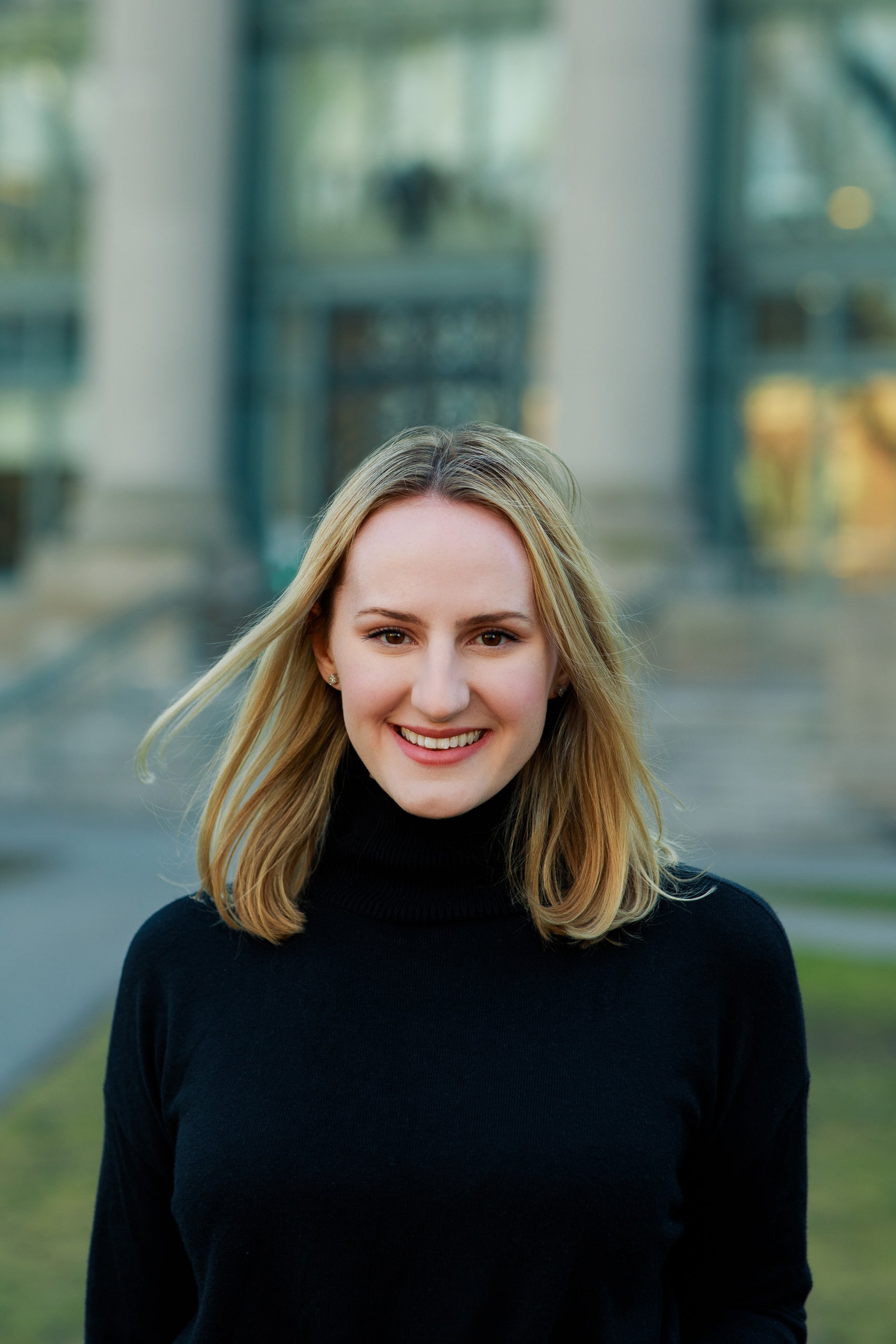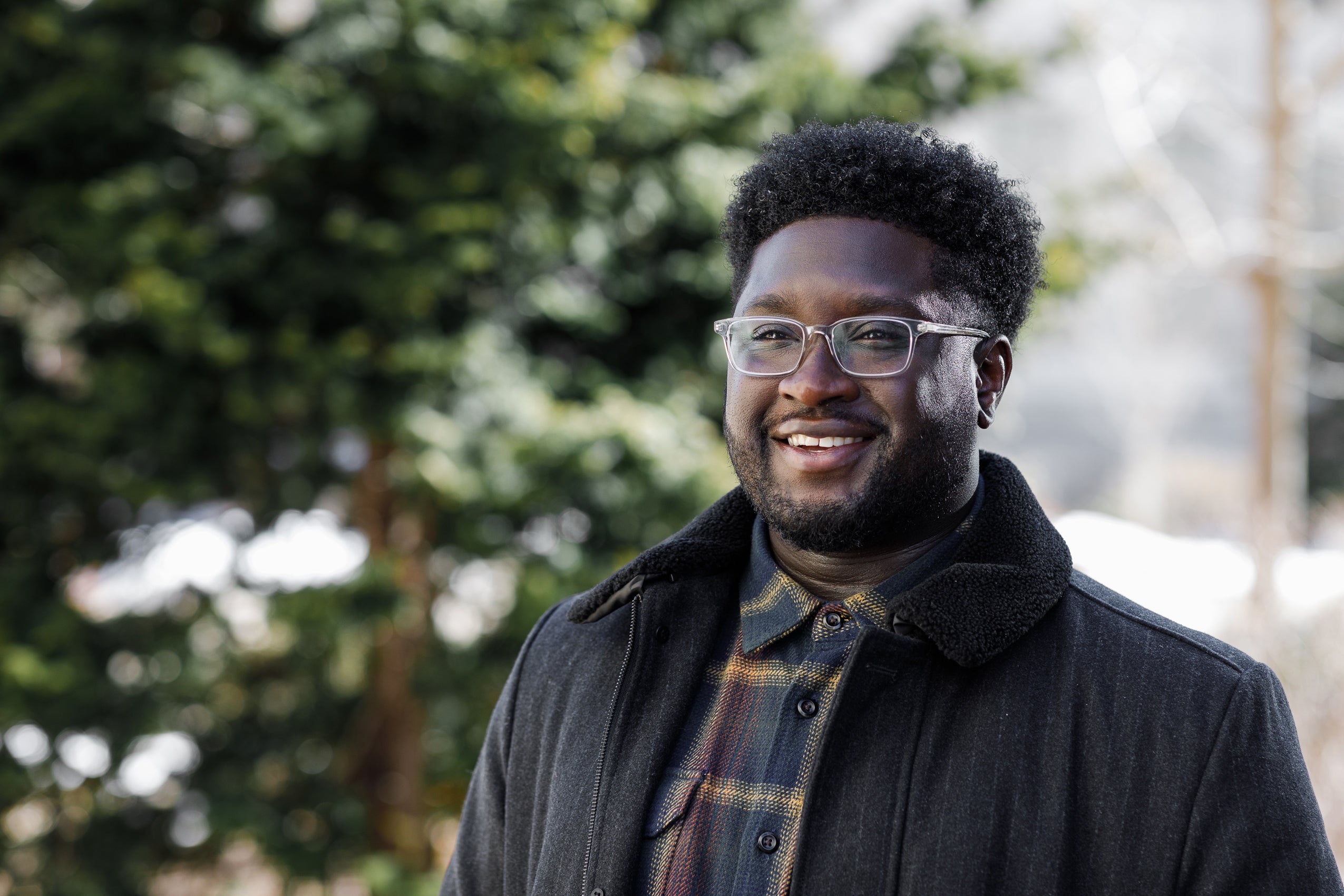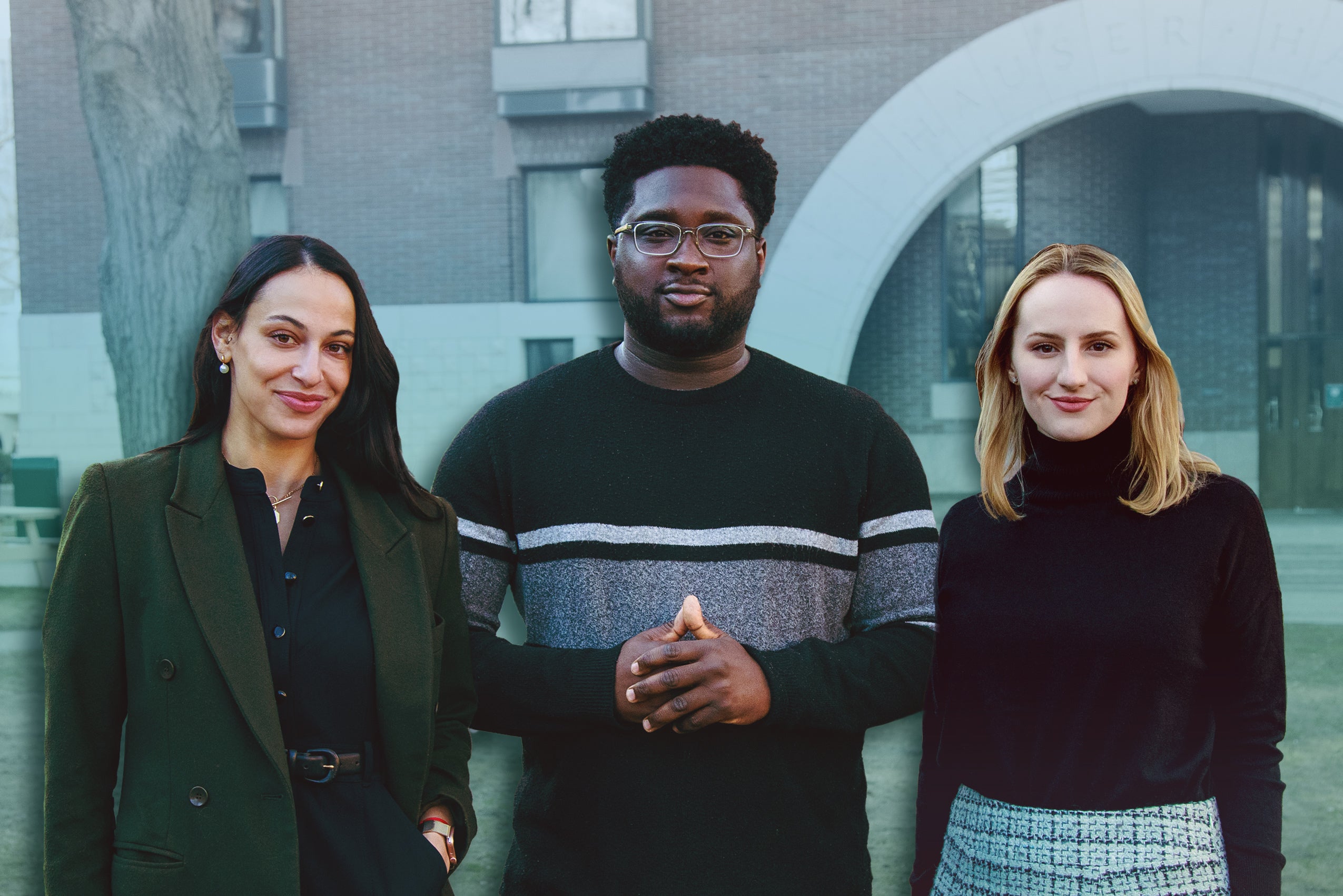In 2022, six Harvard Law School students were selected as Cravath International Fellows. During Winter Term, they pursued independent clinical placements or research projects with an international, transnational, or comparative law focus, exploring legal frameworks and practices in six countries. Here, three of these students describe their experiences.
Juliette Brezin ’23

For her independent research and writing project, Juliette Brezin examined the evolution of women’s land rights in Rwanda, and the role of land ownership in achieving sex equality.
Brezin grew up in France and studied administrative and European law at the Institut d’Études Politiques de Paris (Sciences Po) before coming to HLS. “Having first studied in a civil law system, taking a comparative approach is almost a given for me. I constantly find myself looking at different legal systems and what’s special about them, and I’ve also always been interested in feminist legal scholarship,” she notes. Last semester, Brezin took a course on sex equality with James Barr Ames Visiting Professor Catharine MacKinnon, where she studied how the concept is addressed in international law. She also learned that Rwanda is consistently ranked by the World Economic Forum as one of the top ten countries for women’s participation in the economy, educational achievements, health, and political involvement. “I was fascinated by how Rwanda’s history, especially the 1994 genocide, precipitated sex equality reforms, and how gender equality has become an essential piece of the rebuilding process,” she adds. “I am biracial and come from an Afro-French and Jewish family, so the themes of post-colonialism and genocide particularly resonate with my own identity. It made this research topic all the more fascinating to me.”
Brezin explains that in Rwanda land rights were traditionally passed down to men, often without documented records. The genocide decimated the male population, and women took charge of their lands, but didn’t have the rights that came along with those responsibilities. Since 1999, Rwanda has enacted a series of laws granting women rights to own and use land on an equal status with men, and has launched several national policies to promote women’s economic development and women’s networks.
Before Winter Term, she prepared for her project by reviewing the legislation that was passed, reading UN and NGO reports and legal scholarship, and examining official reports from Rwanda’s Ministry of Gender and Family and Ministry of the Environment, which administers the country’s national land policy. Although a surge in COVID cases and related restrictions prevented her from traveling to Rwanda as planned, she was able to conduct remote interviews with scholars, a member of Parliament, and representatives of civil society organizations.
In her research, Brezin explored the concept of “proximity justice,” a term used to describe Rwanda’s Abunzi system — a local mediation process that existed informally before the genocide but is now recognized in Rwanda’s constitution and enshrined in law. Since 2016, Abunzi committees have focused almost exclusively on land disputes. “Going straight to the courts is expensive; it requires a lawyer, and being able to write a claim, while this mediation system allows oral claims to be made,” she explains. The mediators are community members who are well known and well respected, and 30% of them must be women, although in practice about half of them are. “Their role is to educate the community about the law, especially with respect to inheritance and matrimonial ownership, but in practice, they are very much informal courts of equity,” Brezin adds. Their proceedings are public, and everyone in the community can attend and express an opinion. The committee members recommend solutions to conflicts, but their decisions are ratified by a vote from the attendees. There is an appeal process, and land disputes can still be escalated to the courts, but this occurs in only about 1% of cases.
Many women, however, still don’t know about their rights and many are still illiterate. Brezin’s research shows that women’s networks in Rwanda play a significant role in addressing these challenges, identifying women who need assistance and educating them about their rights and how to exercise them.
Her research will enable her to write a paper that will trace the history of women’s access to land after the Rwandan genocide, identify the restrictions and barriers that women still face, examine the role of women’s networks, and draw lessons about the ways in which proximity justice can address the structural causes of sex inequality. “When it comes to land and other productive resources, sex inequality is intimately related to women’s poverty and exclusion. Improving land rights has a direct effect on women’s personal security, not just in Rwanda but everywhere else,” she observes. Brezin hopes to continue working on this topic in her 3L year, to publish her findings, and to devote at least part of her future legal practice to pro bono work with victims of domestic violence and sex trafficking, which disproportionally affect young poor women and women of color, both domestically and across international borders.
Catherine Cole ’22

Catherine Cole traveled to Santiago, Chile to undertake an independent clinical with the country’s Constitutional Convention — a 155-member elected body with a mandate to write a new federal constitution.
Chile’s current constitution was ratified in 1980, when Augusto Pinochet, who headed Chile’s military government, was in power. “For at least the last decade or so, there’s been a rising current of unease over economic inequality and the perceived lack of a social welfare state,” she explains. Things came to a head in 2019 when it was announced that subway fares in Santiago would be increased. Over one million Chileans protested, leading to a national referendum approving a process to amend the constitution. “The process is 12 months long. I was there for the six-month mark, so I got to see how far it has come and how considerably much further they have to go,” she observes.
Her Winter Term project was a “once-in-a-lifetime opportunity” to work on a constitution and to test the concepts discussed in class. After earning an undergraduate degree in political science from Boston College, Cole spent two years in the Trump White House, in roles including special assistant to the President for trade and manufacturing policy. There, she worked with many lawyers who were “fluent in constitutional law.” At HLS, to achieve the same capability, she has taken courses on the First Amendment, presidential power, and other contemporary issues in constitutional law, and enrolled in the Religious Freedom Clinic. Cole notes that she studied constitutional courts and the differences among countries’ constitutions in a course on comparative constitutional law with Professor Vicki Jackson, and this directly informed the clinical work she undertook this winter.
Cole worked with Ruggero Cozzi, a lawyer and elected member of the convention, and his staff. Her role was to conduct research to support their work on provisions relating to the judiciary and the criminal justice system. One of the memos she drafted focused on military justice — should Chile continue to have a separate court martial system, as is the case in the UK, Germany, the U.S. and many other countries? Cole examined the history and structure of the American system as a comparative example and cited other countries, such as India, that have mentioned court martial systems in their constitutions. “Given the misuse of this system during the Pinochet era to absolve soldiers of crimes against Chilean citizens and dissidents, some convention members have agitated for its dissolution. But, by and large, the theoretical arguments for a separate military justice system are quite persuasive, and it was engrossing to study and catalog them in my report,” she observes. Another project focused on constitutional courts — distinct tribunals, in place in many European and Latin American countries, including Chile, where questions of constitutional law are adjudicated. Cole examined the advantages and disadvantages of this system and considered the features of major court systems in countries with no separate constitutional review.
After graduation, Cole will undertake two federal clerkships, and hopes to work in government again. By working at the convention’s headquarters, taking part in meetings, and witnessing votes, she not only improved her Spanish legal vocabulary dramatically but was able to see Chile’s political process up close. Thinking back on her experience in Washington, observing American politics, she is struck by the similarities: “I saw a lot of partisan gridlock, including intra-party fighting that mirrors the faultlines we’re seeing on the left and on the right in America,” she observes. “It underscored that the challenge of creating good law is universal.”
The project also prompted her to consider larger questions. “I think I went in with a very American lens on ‘what is a constitution?’ We’ve been fortunate enough to have a document that has endured since 1789 and has held up incredibly well. So to my mind, the process of creating a constitution should aim for that longevity. What I hadn’t factored in was that Chile’s current constitution is only 40 years old, and the one before that was only about 50 years old. Hopefully, the new Chilean constitution will last into the future, but it could just be a document for right now, for one or two generations.”
Mohammed Jagana ’22

Mohammed Jagana traveled to the Netherlands to explore the country’s response to COVID-19, as it related to housing programs and services for homeless persons. His interest in this topic, and this country, stems from his experience in living and working in Amsterdam and his work with the Harvard Legal Aid Bureau (HLAB).
After earning a bachelor’s degree in government and politics from St. John’s University, Jagana spent nine months in Amsterdam on a Fulbright program, where he taught English, researched the Dutch system of tracking students into “practical” or “theoretical” education programs and careers, and considered the framework’s adverse impacts on students of color and the children of immigrants.
At HLS, he has worked for two years as a student attorney in the housing practice at HLAB. “After exploring the intricacies of the greater Boston housing market, and how the pandemic affected low-income people and people of color, I wanted to compare what was happening in the Netherlands, where there is more robust social support for healthcare, income stability, education and housing,” he explains.
Before traveling to Amsterdam, Jagana spent some time learning about the country’s legal, judicial, and regulatory systems. Once he was there, he interviewed representatives from the Ministry of the Interior, executives from housing associations, private developers, and representatives from a housing advocacy organization and the Amsterdam Rent Tribunal “Huurcommissie,” an independent entity that mediates landlord-tenant disputes.
He learned that the Netherlands imposes strict mandates for “social housing” — a term used there for subsidized housing managed by private associations or corporations, which are heavily regulated by its federal and municipal governments. For example, a developer seeking to create multi-family rental developments must ensure that a significant percentage (typically 50% or more) of the units are designated for social housing and during the pandemic, the federal government instituted mandatory rent reductions, based on income. Jagana was able to explore his interviewees’ views on the necessity for these policies, their practical effects, the relationship between the government and housing providers, and the impact of COVID-19 on their operations. For example, as a pre-COVID housing shortage persisted, and the pandemic made it necessary for people to work and isolate at home, there was a cost- and profit-related “pull and tug” between housing associations specifying larger units for families and developers wanting to build a greater number of units.
The discussions “were a great way to learn about the roles that the interviewees had in either supporting communities most in need or exacerbating issues of inequity,” he observes. A senior executive at one of the country’s largest housing corporations, for example, reflected on the benefits of having a diverse workforce, with employees who understood their tenants’ culture and values. On the other hand, developers and municipalities were negotiating to include fewer social housing units, in order to balance government requirements for more costly energy-neutral buildings with developers’ concern for making a profit.
Through his comparative lens, Jagana was able to identify safeguards and innovative approaches that could inform how communities, in the U.S. and abroad, respond to future crises. He concludes that low-income persons and other marginalized groups in the Netherlands have, in large part, been minimally affected by the pandemic, at least as compared to similar communities in the United States. “This is mainly attributable to factors such as job stability and social support from the Dutch government, which essentially served as a blanket of protection and ensured that these communities maintained overall economic stability,” he explains.
There was a greater impact on homeless populations. The Netherlands, like other countries, struggled with how to safely house homeless persons in communal settings while adhering to COVID-19 protocols. Jagana was surprised, and impressed, to learn that one of the government’s solutions was to rent rooms in single occupancy hotels for use by homeless individuals. In addition to providing spaces that allowed for social distancing and isolation, an unanticipated benefit was that people suffering from addiction or mental illness fared better in this setting, creating a model the Dutch government and local municipalities may continue to use.
The Cravath International Fellowships were created in 2007 by a group of partners and HLS alumni at Cravath, Swaine & Moore, led by Sam Butler ’54 and the late Robert Joffe ’67.
